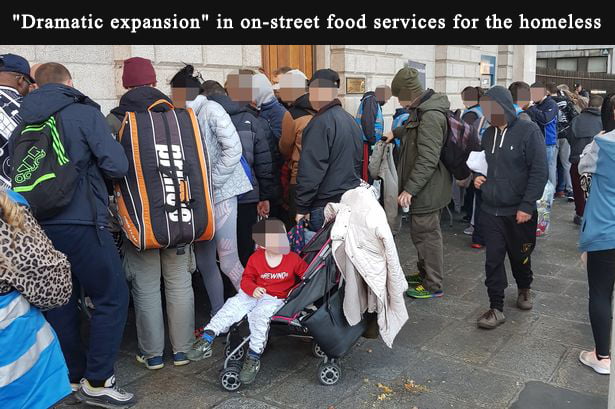“Dramatic expansion” in on-street food services for the homeless; UCD report recommended that existing services to be regulated
UCD reports says there has been a “dramatic expansion” in street and volunteer food services and recommended that existing services to be regulated.
UCD reports has found that homeless people do not need additional on-street food services. The report, commissioned by the Dublin Regional Homeless Executive (DRHE), recommended that existing services be regulated.
According to the report, there has been a “dramatic expansion” in street and volunteer food services in recent years.
The study, prepared by UCD’s School of Social Policy, Social Work and Social Justice, looked at five days of legally supported programmes for the homeless community in Dublin.
They reviewed the day-to-day services for homeless people prior to Covid. And for more detailed information, representatives of DRHE funded services were interviewed.
The UCD review notes that the significant increase in voluntary food services in recent years has not been linked to the DRHE-funded Capuchin Day Center, Merchants’ Quay Ireland, Focus and Cross Care.
Representatives interviewed for the review said that ‘extra food’ in Dublin was the result of the rise in soups and the distribution of sandwiches by volunteers.
Feeding homeless all day is a great opportunity to interact with them. Because of this, they are able to access more and more follow-up services, the report said.
Most of the DRHE-funded day services focus on ensuring that the homeless or those who are not living at all have access to basic amenities such as food, shelter and showers.
Food services are currently the only one-day service area in Dublin with excessive provision. The report points out that the main reason for this is the recent emergence of informal volunteer-led services in Dublin that provide street food to the homeless.
The report said there was no doubt that the volunteers were providing these services with the sole aim of helping the homeless. But it also says it does not need these extra food services.
Providers of DRHE-funded day-to-day services consulted for the study argued that this on-street provision of food to homeless services weakens their efficacy by limiting their ability to engage clients effectively and by referring them to a broader range of support services that these day-to-day services can provide.
The review also found shortcomings in existing DRHE-funded day-to-day services, including the provision of specialized primary and secondary health care for the homeless.
The review found that day services underestimate immigrants and unmarried women and that clear plans are needed for future conditions.
In addition, the review calls for DRHE to work with the Food Safety Authority of Ireland and the HSE to formulate a strategy to control the growth of street feeding.


Comments are closed.